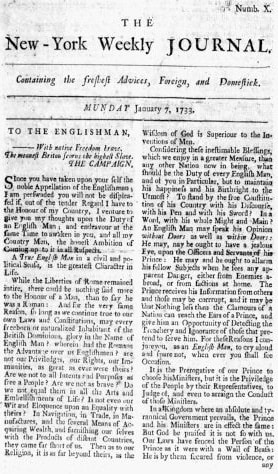
In 1733, Zenger began printing The New York Weekly Journal, which voiced opinions critical of the colonial governor, William Cosby. On November 17, 1734, on Cosby's orders, the sheriff arrested Zenger. After a grand jury refused to indict him, the Attorney General Richard Bradley charged him with libel in August 1735. Zenger's lawyers, Andrew Hamilton and William Smith, Sr., successfully argued that truth is a defense against charges of libel.
In 1733, Zenger printed copies of newspapers in New York to voice his disagreement with the actions of the newly appointed colonial governor William Cosby. On his arrival in New York City, Cosby had plunged into a rancorous quarrel with the council of the colony over his salary. Unable to control the colony's supreme court, he removed Chief Justice Lewis Morris, replacing him with James DeLancey of the Royal Party. Supported by members of the Popular Party, Zenger's New-York Weekly Journal continued to publish articles critical of the royal governor. Finally, Cosby issued a proclamation condemning the newspaper's "divers scandalous, virulent, false and seditious reflections."
Zenger was charged with libel. James Alexander was Zenger's first counsel, but the court found him in contempt and removed him from the case. After more than eight months in prison, Zenger went to trial, defended by the Philadelphia lawyer Andrew Hamilton and the New York lawyer William Smith, Sr. The case was now a cause célèbre, with public interest at fever-pitch. Rebuffed repeatedly by chief justice James DeLancey during the trial, Hamilton decided to plead his client's case directly to the jury. After the lawyers for both sides finished their arguments, the jury retired, only to return in ten minutes with a verdict of not guilty.
In defending Zenger in this landmark case, Hamilton and Smith attempted to establish the precedent that a statement, even if defamatory, is not libelous if it can be proved, thus affirming freedom of the press in America; however, succeeding royal governors clamped down on freedom of the press until the American Revolution. This case is the groundwork of freedom of the press, not its legal precedent. As late as 1804, the journalist Harry Croswell lost a series of prosecutions and appeals because truth was not a defense against libel, as decided by the New York Court of Appeals in People v. Croswell. It was only the following year that the assembly, reacting to this verdict, passed a law that allowed truth as a defense against a charge of libel.
 RSS Feed
RSS Feed